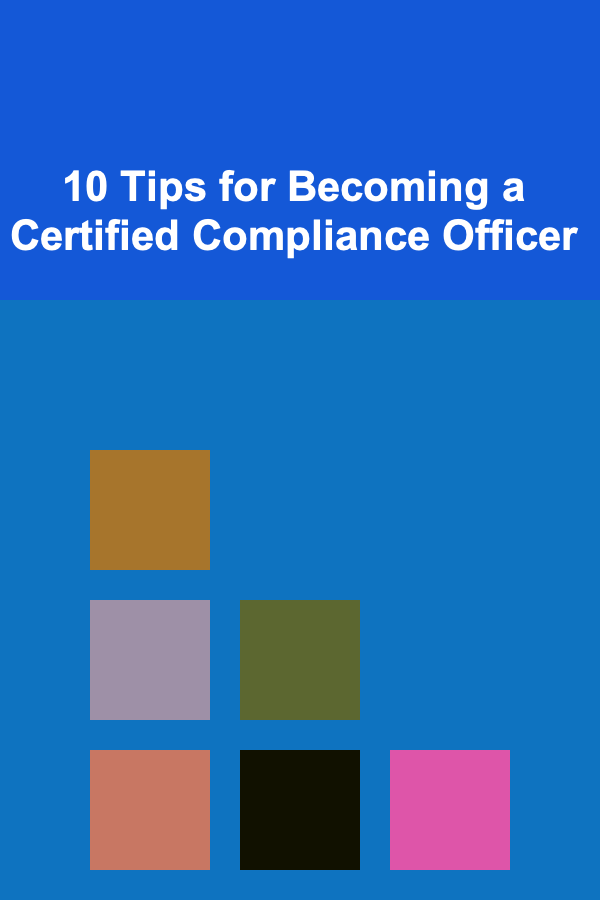
10 Tips for Becoming a Certified Compliance Officer
ebook include PDF & Audio bundle (Micro Guide)
$12.99$5.99
Limited Time Offer! Order within the next:

Compliance officers play a crucial role in ensuring that organizations follow legal regulations, industry standards, and internal policies. They help mitigate legal risks, ensure transparency, and maintain ethical practices within an organization. For those interested in pursuing a career in compliance, becoming a certified compliance officer is often a critical step.
In this article, we'll explore 10 essential tips that will help you become a certified compliance officer. Whether you're just starting out in the field or seeking to advance your career, these strategies will help you achieve your certification and stand out in the highly competitive field of compliance.
Understand the Role of a Compliance Officer
Before embarking on the journey to become a certified compliance officer, it is essential to understand the scope and responsibilities of the role. A compliance officer ensures that an organization adheres to laws, regulations, and internal policies. They are responsible for monitoring company operations, identifying potential risks, and implementing strategies to ensure legal and ethical compliance.
Key Responsibilities Include:
- Risk Management: Identifying and managing risks that could negatively affect the organization.
- Policy Development: Creating and enforcing policies that comply with relevant regulations.
- Training and Education: Educating employees about compliance issues and fostering a culture of compliance.
- Investigating Violations: Conducting investigations into alleged violations and ensuring corrective actions are taken.
Understanding these core responsibilities is essential because it provides context for the skills and knowledge you'll need to acquire on your journey to certification.
Obtain a Relevant Educational Background
Most certified compliance officers have a strong educational foundation. While there isn't a single path to becoming a compliance officer, a relevant degree is often a requirement for most employers and certification bodies. A background in business, finance, law, or a related field will give you the foundational knowledge necessary to succeed in this role.
Recommended Degrees:
- Business Administration (MBA)
- Law (JD or LLM)
- Finance
- Accounting
- Health Administration
These degrees equip you with a broad understanding of regulations, corporate governance, and financial management --- all of which are essential for a career in compliance.
Additionally, specific compliance-related coursework or certifications can bolster your resume and give you a more specialized understanding of the field.
Gain Relevant Work Experience
Practical experience is one of the most valuable assets for a compliance officer. Many employers look for candidates who have worked in roles related to legal, risk management, auditing, or internal controls. Before becoming a compliance officer, it can be beneficial to start in a junior or support role in compliance or risk management.
Steps to Gain Experience:
- Internships: Look for internships or entry-level positions in compliance-related departments. This will provide hands-on experience and help you build professional connections.
- Job Shadowing: Seek opportunities to shadow a senior compliance officer to learn about their day-to-day responsibilities.
- Cross-Department Experience: Many compliance officers come from a background in law, auditing, or finance, so working in these departments can provide valuable skills.
Having direct experience in the areas of internal auditing, corporate governance, or legal compliance will give you a deeper understanding of compliance protocols and make you more competitive when pursuing certification.
Choose the Right Certification Program
Becoming a certified compliance officer requires obtaining one of the various compliance certifications offered by professional organizations. The right certification program will depend on your industry, career goals, and prior experience. Below are some of the most respected certification options:
Popular Certifications:
- Certified Compliance & Ethics Professional (CCEP) - Offered by the Society of Corporate Compliance and Ethics (SCCE), this certification is one of the most recognized in the industry.
- Certified Regulatory Compliance Manager (CRCM) - Offered by the American Bankers Association (ABA), this certification is ideal for compliance professionals working in the banking industry.
- Certified Information Systems Auditor (CISA) - For compliance officers focusing on information systems and cybersecurity, CISA certification from ISACA is an excellent choice.
- Certified Fraud Examiner (CFE) - This certification is perfect for compliance officers interested in fraud prevention and detection.
- Health Care Compliance Association (HCCA) Certifications - For those working in the healthcare industry, the HCCA offers specialized compliance certifications.
Carefully assess the certifications available, considering both the requirements and your career aspirations. For example, if you're working in a healthcare organization, a healthcare-focused certification may be more beneficial than a general compliance certification.
Develop Strong Knowledge of Regulations
Compliance officers are experts in understanding and interpreting regulations. They need to stay updated on the laws and regulations that govern their industry and ensure that their organization remains compliant.
Key Areas to Focus On:
- General Business Laws: Understanding laws relating to business operations, contracts, and corporate governance.
- Industry-Specific Regulations: Depending on the sector you work in (e.g., finance, healthcare, manufacturing), familiarize yourself with industry-specific regulations such as HIPAA (for healthcare) or GDPR (for data protection).
- International Regulations: For global compliance, it is important to understand international regulations that could impact your organization, such as the Foreign Corrupt Practices Act (FCPA) or anti-money laundering (AML) regulations.
A deep understanding of the regulatory landscape will help you advise your organization on compliance risks and ensure adherence to legal and ethical standards.
Master Risk Management and Assessment
One of the key aspects of compliance is the ability to assess and manage risks. As a compliance officer, you must identify potential risks to the business, evaluate their impact, and put strategies in place to mitigate them. Risk management skills are crucial for developing compliance programs and ensuring your organization's operations comply with relevant laws.
Key Risk Management Areas:
- Identifying Risks: Understanding the potential risks that could affect your organization's reputation, finances, or operations.
- Evaluating Risks: Analyzing the severity and likelihood of each risk, taking into account the potential consequences.
- Mitigating Risks: Developing strategies to minimize or eliminate risks, including internal controls, audits, and corrective actions.
A well-rounded understanding of risk management will not only help in ensuring compliance but also play a significant role in shaping the organization's overall risk strategy.
Cultivate Strong Analytical and Problem-Solving Skills
Compliance officers are responsible for analyzing complex legal documents, regulations, and company policies. They need to be detail-oriented, have critical thinking abilities, and be able to interpret laws and regulations effectively. Analytical skills are crucial for identifying compliance issues and creating solutions.
Important Skills to Develop:
- Legal and Regulatory Analysis: The ability to read, understand, and apply complex legal documents and regulatory requirements.
- Problem Solving: The capacity to identify compliance issues and create feasible solutions to resolve them.
- Attention to Detail: Being able to spot discrepancies in documents, reports, and practices that could indicate potential compliance failures.
Being an effective problem solver will make you a valuable asset to any organization, as it allows you to resolve issues efficiently and maintain the organization's legal standing.
Stay Updated with Industry Trends
Compliance is an evolving field, with new laws, regulations, and technologies emerging regularly. A compliance officer must stay informed about the latest trends, regulatory changes, and industry best practices to remain effective in their role.
Ways to Stay Updated:
- Attend Conferences and Webinars: Participate in industry conferences and webinars to learn about the latest compliance trends and network with other professionals.
- Read Industry Publications: Subscribe to compliance-related journals, magazines, and blogs to stay informed about changes in laws and best practices.
- Join Professional Associations: Become a member of organizations like the SCCE, ABA, or HCCA to gain access to resources, training, and networking opportunities.
Keeping yourself informed about the latest developments in compliance will help you adjust to changes and remain an effective leader in your organization.
Build Strong Communication Skills
As a compliance officer, you will be interacting with different departments, leadership teams, legal professionals, and external stakeholders. Strong communication skills are essential for explaining complex compliance matters, reporting findings, and training employees.
Areas of Communication to Focus On:
- Clear Reporting: Being able to present compliance issues and risks to leadership in a clear, concise, and professional manner.
- Training and Education: Communicating compliance procedures to staff in a way that ensures understanding and promotes adherence to policies.
- Negotiation and Persuasion: Navigating compliance challenges and ensuring that all departments comply with established guidelines.
Strong communication skills are key to influencing positive compliance behavior throughout the organization and fostering a culture of compliance.
Network and Build Relationships
Networking with other compliance professionals can provide valuable insights, career advancement opportunities, and access to resources that can aid in your certification process. Building relationships with individuals within your industry can provide mentorship, advice, and support as you pursue your certification and professional goals.
Networking Strategies:
- Join Professional Organizations: Attend events and participate in discussions to meet other compliance professionals.
- Seek Mentorship: Find a senior compliance officer or mentor who can offer guidance and insight into navigating the complexities of the field.
- Build a Professional Reputation: Engage in online forums and publish content related to compliance issues to build your credibility within the industry.
Networking is an invaluable resource for both professional growth and career development.
Becoming a certified compliance officer requires dedication, education, and practical experience. By following these 10 tips, you'll be well on your way to earning your certification and succeeding in the dynamic and rewarding field of compliance. Whether you're starting your career or advancing in your current role, embracing these steps will help you develop the knowledge, skills, and professional connections needed to thrive in this essential profession.
Reading More From Our Other Websites
- [Home Cleaning 101] How to Descale and Sanitize Your Coffee Maker Using Household Ingredients
- [Organization Tip 101] How to Use Clear Containers for Organized Storage
- [Personal Investment 101] How to Invest in Real Estate with Limited Capital
- [Home Budget 101] How to Budget for Home Security Without Sacrificing Your Financial Stability: Smart Home Budgeting Ideas
- [Organization Tip 101] How to Make Laundry Day More Efficient
- [Home Family Activity 101] How to Create a Family Game Room on a Budget
- [Star Gazing Tip 101] Best DIY Light‑Pollution Filters for Enhancing Visible Nebula Details in Urban Settings
- [Organization Tip 101] How to Organize Your Skincare Products for Easy Access
- [Personal Investment 101] How to Prepare for a Real Estate Market Downturn
- [Organization Tip 101] How to Declutter Your Mind Through Organization

How to Create a Sustainable Seasonal Wardrobe
Read More
How to Create a Zen Space in Your Home
Read More
The Public Relations Manager's Guide: Mastering Brand Reputation and Media Relations
Read More
Potty Training Power: A Stress-Free Approach
Read More
How to Select the Best Portable Bike Pump for On-the-Go Inflation
Read More
10 Tips for Safe Electronics Tinkering Practices
Read MoreOther Products

How to Create a Sustainable Seasonal Wardrobe
Read More
How to Create a Zen Space in Your Home
Read More
The Public Relations Manager's Guide: Mastering Brand Reputation and Media Relations
Read More
Potty Training Power: A Stress-Free Approach
Read More
How to Select the Best Portable Bike Pump for On-the-Go Inflation
Read More